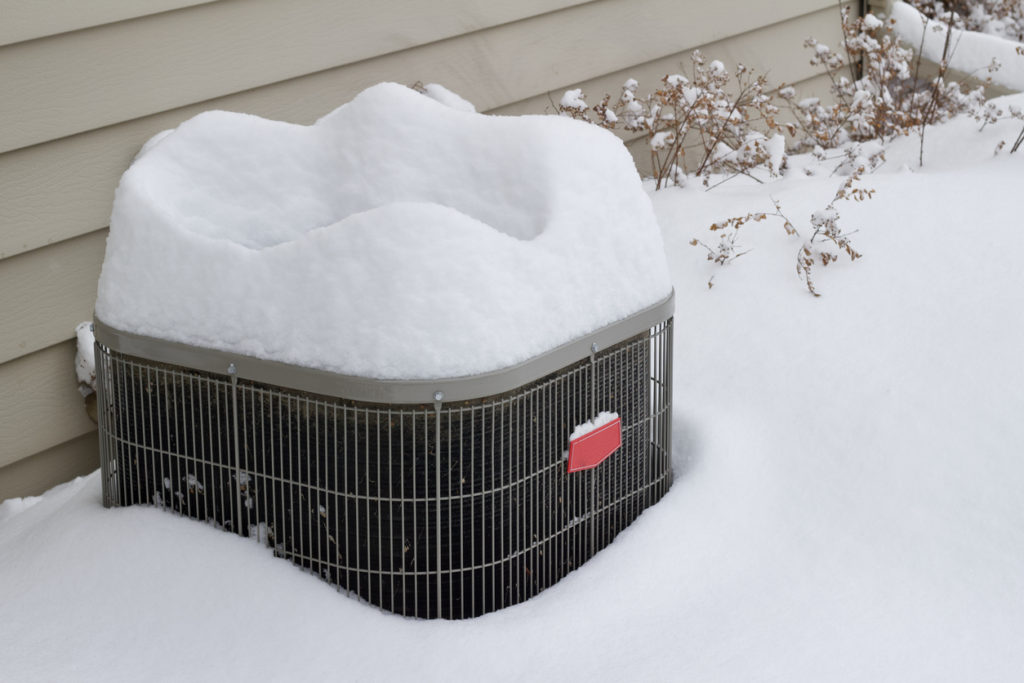
Heat pump repair issues are some of the more common calls we get during the winter months. While not all of these require service, there are a few issues that are important to keep an eye out for.
To help you stay vigilant (and warm!), here’s what we hear most often from homeowners – and what you need to do if these scenarios happen to you.
1. “My heat pump is frozen.”
Sometimes, homeowners check their heat pump and find that it’s become encased in a block of ice. This can be a little disconcerting, but it’s not uncommon.
In fact, the coil of a heat pump typically operates at a temperature below 32 degrees Fahrenheit, so any condensation is likely to freeze there. It should be regularly defrosted, though. When it’s not, it’s usually for one of two reasons:
The defrost cycle is defunct.
While ice will naturally build up as the heat pump functions, it should be melted via a defrost setting at regular intervals. Depending on the manufacturer and the programming settings, this may be every 30, 60, or 90 minutes. Sometimes, though, this function fails, leading to ice buildup that affects the pump’s ability to keep things warm.
I’d say that about eight out of every ten “frozen heat pump” calls we get are due to a failed defrost.
The refrigerant needs to be charged.
Less commonly, the refrigerant in your system might have a low charge and need to be refreshed, whether due to a leak or simply the passage of time.
What you need to do: If your heat pump isfrozen and the defrost doesn’t seem to be working, it probably is worth a service call.
2. “My heat pump is making a lot of noise.”
This is a call we get pretty often, too. Here’s the bad news: Heat pumps are generally pretty loud.
The reality is that these are complicated machines that are working inside of metal cases in cold weather. The defrost cycle is loud. All of this leads to some jangling and whooshing and buzzing. It’s usually in service of heating your home.
The good news is that a) loud heat pumps often aren’t broken, and b) we can often help to reduce the noise your system is making. When we’re called out for a noisy heat pump, we can tighten up case bolts and reduce the amount of vibration that’s happening to quiet things down.
Of course, noise can sometimes signal a problem. If you’re hearing a shrieking sound, for example, it might indicate that your motor is on its way to burning out, and you’ll likely want to call a service technician.
What you need to do: Be willing to put up with some buzzing, and if things seem abnormal – past the realm of metal and fans in cold air – get in touch with us.
3. “My heat pump is on fire.”
I have good news on this one: Your heat pump is probably not on fire.
Most often, when we get this call, it’s because homeowners have seen steam rising from the heat pump during a defrost cycle and mistaken it for smoke. It makes sense; if you aren’t expecting to see steam, this is a pretty easy mistake to make.
So, take it from us: Expect to see steam. To keep running in the cold, your system will need to melt the ice that condensates on the coil, and sometimes you’ll see that evaporation rising into the air.
What you need to do: Probably nothing. If it doesn’t smell like smoke, you don’t need to call anyone.
4. “My auxiliary heat is running.”
In the depths of winter, I get this call seven days a week and twice on Sundays. The good news is that, most of the time, having your auxiliary heat running is not a cause for concern.
Heat pumps, unlike gas furnaces, aren’t designed to keep homes comfortable in extreme cold. Auxiliary heat systems supplement heat pumps to help bridge the gap and keep your home warm. While we can fine-tune your systems to raise the threshold at which auxiliary heat kicks on, homeowners often find that the factory settings serve them well.
Now, if your auxiliary heat is running and the temperature outside is relatively mild – say, in the 40s or 50s – you may have a problem. In that case, it’s probably best to schedule a service call.
What you need to do: Unless your auxiliary heat is running in mild weather, you don’t need to do anything.
5. “I think my heat pump is creating a lot of static electricity in my home.”
Okay, I’ll be honest – people don’t really call us to say this; the connection isn’t very obvious. But it is a common scenario, and it often comes up when our techs are in the field.
Here’s why: Heat pumps run on electricity, and as they function, they can create static charges in your home. And, winter is a dry season, which makes the situation worse. If your home has a heat pump and you notice an uncomfortable amount of static electricity, it may be worth it to get a humidifier.
During the winter months, humidifiers can help your home to retain heat and increase the efficiency of your heating system – and they can reduce the likelihood of static shocks by adding more moisture to the air.
What you need to do: If static charges are a problem, call us to discuss how a humidifier might help.
Need to make a heat pump repair call?
Keep an eye out for those five issues and you’ll be on the road toward effectively maintaining your heat pump.
And, if you do need to make a repair call, get in touch with us.
Our expert technicians will review your systems to ensure they’re in working order and offer efficient repairs if they’re not. We can quickly check all of your system components (including your heat pump, but also your humidifier, boiler, and more) so that you can be prepared and warm for the winter months.
And, of course, when you do call, we’ll treat you like family. Our promise, always, is that you can trust your home – and your heat pump – to us.


